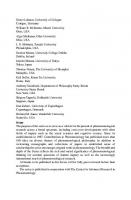The Europeanized Elite in Russia, 1762–1825: Public Role and Subjective Self 9781501757723
This illuminating volume provides a new understanding of the subjective identity and public roles of Russia's Europ
105 37 53MB
English Pages 420 [383] Year 2016
Recommend Papers

- Author / Uploaded
- Andreas Schönle (editor)
- Andrei Zorin (editor)
- Alexei Evstratov (editor)
File loading please wait...
Citation preview
The Europeanized Elite in Russia, 1762-1825
Europeanized Elite in Russia,
The
1762-1825 PUBLIC ROLE AND SUBJECTIVE SELF
EDITED BY ANDREAS ANDREI
SCHONLE,
ZORIN, AND ALEXEI EVSTRATOV
NIU Press I DeKalb
Northern Illinois University Press, DeKalb 60 115 © 2016 by Northern Illinois University Press All rights reserved 25 24 23 22 21 20 19 18 17 16 1 2 3 4 5 978-0-87580-747-8 (paper) 978-1-60909-207-8 (ebook) Book and cover design by Yuni Dorr The research for this volume and its publication were supported by a grant from The Leverhulrne Trust (RPG-357). Library of Congress Cataloging-in-Publication Data Names: Schonle, Andreas, editor. I Zorin, Andrei, editor. I Evstratov, Alexei, editor. Title: The Europeanized elite in Russia, 1762-1825: public role and subjective self I Edited by Andreas Schonle, Andrei Zorin, and Alexei Evstratov. Description: DeKalb: Northern Illinois University Press, c2017.1 Includes bibliographical references. Identifiers: LCCN 2016008797 (print) I LCCN 2016021988 (ebook) I ISBN 9780875807478 (pbk.: alk. paper) I ISBN 9781609092078 (ebook) I ISBN 9781609092078(Ebook) Subjects: LCSH: Elite (Social sciences)-Russia-History-18th century. I Elite (Social sciences) -Russia-History-19th century. I Russia-Social conditions-18th century. I Russia-Social conditions-19th century. I Russia-Relations-Europe.! Europe-Relations-Russia. Classification: LCC HN530.Z9 E432 2017 (print) I LCC HN530.Z9 (ebook) I DDC 305.5/20947-dc23 LC record available at https://lccn.loc.gov/2016008797
Contents
Acknowledgments Illustrations Abbreviations
vii
ix x
Note on Transliteration and Dates
xi
INTRODUCTION
1
INTERNALIZING PUBLIC ROLES: ZEALOUS SERVICEMEN AND CURIOUS NOBLEMEN
23
From Passions to Ambitions: Human Nature and Governance from Peter I to the
Emancipation of the Nobility IIgor Fedyukin
26
Curiosity, Utility, Pleasure: Official Discourses of Natural Philosophy and Their Alternatives in Russia in the Run-up to 17621 Alexander losad
2 THE COURT AND THE FAMILY: LONELY WIVES
46
CUCKOLDED HUSBANDS AND
66
Dramatic Conflicts and Social Performance at the Russian Court in the 1760s:
A Sociocultural Perspective on Marital Infidelity IAlexei Evstratov
70
Performing Womanhood in Eighteenth-Century Russia: Cultural Identity in the Letters of
Ekaterina Rumiantseva and Dar'ia Saltykova I Michelle Lamarche Marrese
3
90
THE DOMESTIC ECONOMY: BETWEEN OSTENTATION AND RATIONALIZATION
112
The Practice of Personal Finance and the Problem of Debt among the Noble Elite in Eighteenth-Century Russia IElena Korchmina
116
Self-fashioning, Estate Design, and Agricultural Improvement: 1.1. Bariatinskii's
Enlightened Reforms of Country Living I Andreas Schonle
4
13 6
OFFICERS OFF THE BATTLEFIELD: MANAGERS AND THINKERS
155
Warriors in Peace: The Everyday Life of Russian Officers at the Beginning of the Nineteenth Century I Stanislav Andriainen
158
The Political Language of the Europeanized Military Elite in the Early Nineteenth Century:
The Unpublished Diary and Letters ofVasilii Viazemskii I Mikhail Velizhev
176
5
ALTERNATIVE SOCIABILITIES AND SPIRITUALITIES: THE LODGE AND THE ENGLISH CLUB
197
The Emotional Culture of Moscow Rosicrucians: An Experiment in Alternative 201 Europeanization IAndrei Zorin The Moscow English Club and the Public Sphere in Early Nineteenth-Century Russia IMikhail Velizhev 220
6
EXPERIENCING THE OTHER: FOREIGNERS AND 238 COACHMEN Russian Prince vs. "German Swine": Public Slap in the Face, Emigres, and Local Elites in St. 242 Petersburg at the Time of the French Revolution I Alexei Evstratov Between Friends, the Coachman: Enlightenment Encounters Empire in Russia's 261 Eighteenth Century I John Randolph
7 THE RADICAL BIFURCATION: THE WAY TO EUROPE AND TO THE CONVENT
277
The Instability of Time and Plurality of Selves at Court and in Society 281 IAndreas SchOnle Sentimental Piety and Orthodox Asceticism: The Case of Nun Serafima IAndrei Zorin 300
CONCLUSION Bibliography
327
Contributors
349
Index
351
318
Acknowledgments
This volume owes its existence to a research grant titled "The Creation of a Europeanized Elite in Russia: Public Role and Subjective Self" awarded by the Leverhulme Trust (RPG-357). This grant supported the preparation of two books, of which this is the first. Among other things, the grant enabled the appointment of a research assistant for two years, supported the archival research undertaken by our consultants in Russia, and allowed the principal investigators some precious time off teaching. We are deeply grateful to the Leverhulme Trust for its support, as well as for its flexibility during the threeyear tenure of our grant. At different stages of the grant, we benefited greatly from the input of our Advisory Board, which consisted of Wladimir Berelowitch, Simon Dixon, Catriona Kelly, Dominic Lieven, and Derek Offord. Their commitment to our project has been much beyond the call of duty and has given rise to heady and lively discussions, which helped us avoid many pitfalls. Roger Bartlett, Andrew Kahn, and Paul Keenan have also participated in some of our internal research meetings and contributed extensive feedback on our work, for which we thank them profusely. We remain, of course, solely responsible for the content of this volume. We presented individual research papers or intermediary reports of our research at various conferences and in various seminars, notably at the University of Oxford, Queen Mary University of London, the German Historical Institute in Moscow, the annual conference of the Association for Slavic, East European, and Eurasian Studies in Boston, the annual meeting of the Study Group on Eighteenth-Century Russia in Hoddesdon, and the East European History Seminar at Humboldt University in Berlin. The questions and comments we received from panel chairs, discussants, and participants sharpened our thinking greatly. Particular recognition is due to Gary Marker and Richard Wortman, whose constructive skepticism was crucial. We thank the organizers and participants of these events for the opportunity to present our thoughts and for the feedback we received. We also thank our peer reviewers, Marcus Levitt and an anonymous reviewer, for their pertinent suggestions and comments. The project relied on extensive archival work, and for their assistance in locating materials we wish to thank the staff at the State Archive of Ancient Acts, the State Archive of the Russian Federation, the Manuscript Collection of the Russian State Library, the Division of Written Sources of the State
viii
ACKNOWLEDGMENTS
Historical Museum, the Russian State Archive of Literature and Art, the Russian State Archive of the Navy, and the Russian State Military Historical Archive, all in Moscow; the Manuscript Division of the Institute of Russian Literature (Pushkin House), the Manuscript Division of the Russian National Library, the Russian State Archive of History, and the Archive of the Museum of Artillery, Engineering, and Communication Corps in St. Petersburg; the State Archive of Novgorod Oblast' in Novgorod, and, finally, the National Archives in Kew. Essential library work was undertaken at the British Library in London, the Bodleian Library in Oxford, the Russian National Library in St. Petersburg, as well as the Russian State Library and the State Public Historical Library in Moscow, and we are indebted to these institutions for access to their extensive collections. Last but not least, we are grateful to Amy Farranto and the other staff at Northern Illinois University Press for their enthusiastic response to our project and their support throughout, as well as to Joyce Goldenstern, who expertly prepared what must have been a very complex index to produce.
Illustrations
Fig.1
Astronomiia, by Boris Sukhodol'skii (1754)
55
Fig. 2
Astronomy, published by Robert Sayer (c. 1750) (after Richard Houston) 55
Fig. 3 Anna Mikhailovna Vorontsova, by Louis Tocque (c. 1758) Fig. 4
72
Cast list of an amateur performance of Le Philosophe marie, by Philippe Nericault Destouches (St. Petersburg, 1765) 78
Fig. 5 Ekaterina Mikhailovna Rumiantseva, unknown (1780s) and Dar'ia Petrovna Saltykova, by Fran(j:ois Hubert Drouais ( 17 62) 91 Fig. 6
Palace in Mar'ino, by an unknown painter (1816-1821)
146
Fig. 7 Great Parade on Dvortsovaia Square, by Benjamin Patersen (1808)
168
Fig. 8 Title page picture from Karl von Eckartshausen, Vazhneishie ieroglify dlia chelovecheskovo serdtsa, vol. 1 (St. Petersburg, 1803) 207 Fig. 9 Nikolai Grigor'evich Shcherbatov, by John Dow (Military Gallery of the year 1812 in the Winter Palace) 243 Fig. 10
A Postal Troika in Winter Landscape, by Aleksandr Orlovskii (engr. by Beggrov, 1819) 262
Abbreviations
AMAIV-Arkhiv muzeia artillerii, inzhenernykh voisk, i voisk sviazi (Archive of the Museum of Artillery, Engineering, and Communication Corps) GANO-Gosudarstvennyi arkhiv Novgorodskoi oblasti (State Archive of Novgorod Oblast') GARF-Gosudarstvennyi arkhiv Rossiiskoi Federatsii (State Archive of the Russian Federation) GIM OPI-Gosudarstvennyi istoricheskii muzei. Otdel pismennykh istochnikov (State Historical Museum Division ofWritten Sources) IRLI RO-Rukopisnyi otdel Instituta russkoi literatury (Pushkinskii dom) (Manuscript Division of the Institute of Russian Literature. Pushkin House) KFZh-Kamer-fur'erskii tseremonial'nyi zhurnal (Ceremonial Diary of the Chamber Fourrier) PSZ-Polnoe sobranie zakonov Rossiiskoi Imperii s 1649 goda (Complete Collection of Laws of the Russian Empire since 1649), Pervoe sobranie RGA VMF-Rossiiskii gosudarstvennyi arkhiv voenno-morskogo flota (Russian State Archive of the Navy) RGADA-Rossiiskii gosudarstvennyi arkhiv drevnikh aktov (State Archive of Ancient Acts) RGALI-Rossiiskii gosudarstvennyi arkhiv literatury i iskusstva (Russian State Archive of Literature and Art) RGB OR-Rossiiskaia gosudarstvennaia biblioteka. Otdel rukopisei (Manuscript Collection of the Russian State Library) RGIA-Rossiiskii gosudarstvennyi istoricheskii arkhiv (Russian State Archive of History) RGVIA-Rossiiskii gosudarstvennyi voenno-istoricheskii arkhiv (Russian State Military Historical Archive) RNB OR-Rossiiskaia natsional'naia biblioteka. Otdel rukopisei (Manuscript Department of the Russian National Library)
Note on Transliteration and Dates
In keeping with standard scholarly practice, we have used the Library of Congress transliteration system to render Russian names and words, except where there is a well-established English equivalent. Dates are indicated in the Old (Julian) Style except where otherwise noted.
INTRODUCTION
R:
ssian history is not short of utopian projects. Some, like communism, are defined as such when they failed or are close to failure. Others scape this kind of analysis at all, because they largely succeeded. This book is devoted to such an exceptional enterprise. It would not be too difficult to argue the impossibility of creating a Europeanized educated upper class residing in a predominantly non-European country, had history not proved the contrary. The changes initiated by the emperor Peter the Great in the early eighteenth century were dramatic, but not entirely unique in the annals of history. They arguably represented the most far-reaching attempt at enforced Westernization until the Meiji restoration in Japan in 1868 and the Ataturk reforms in Turkey in the 1920s. Russian parallels have been obvious to the ideologues ofJapanese and Turkish reforms as well as to the scholars studying them (Beasley 1973, 82, 91; Mardin 2002, 357, 370). 1 The editors of a recent volume on Turkish modernization start their introduction by referring implicitly to the famous formula from Pushkin's Bronze Horseman, comparing Ataturk who "opened wide windows to the west-those that were already half-open as well as those that remained shut until his reforms" to Peter the Great, who "hacked through
2
INTRODUCTION
the ice that surrounded Russia to open a window to the West" (Kerslake, Oktem, Robins 2010, 1). As in Russia, which began to forge a Europeanized nobility for military and civil service in the context of its prolonged war with Sweden in the early eighteenth century, the complete overhaul of the basic institutions and practices of national life in Turkey and Japan was prompted by a military situation, in this instance after major military defeats. In both instances, Westernization was an inevitable response to the challenges posed by Western civilization, perceived to be more advanced militarily, economically, technologically, and culturally (Esenbel 2011, 167-168). Russian and Japanese emperors as well as Turkish national leaders viewed their own country as not only backward but dangerously fragile, risking annihilation by their more advanced rivals. The time span left for catching up was usually deemed precariously short, not allowing reliance on gradual evolutionary changes. At the same time, this transformation was regarded and promoted by the authorities as a significant step toward enlightenment, interpreted mostly in universalist terms. While warning against slavish imitation of Western patterns (he was especially worried about material inequality), Fukuzava Yakuchi, one of the most influential thinkers of the Meiji restoration, wrote that "the West's wealth and power must be truly envied:' (His treatise about the advantages of learning was published in 3,400,000 copies.) He believed that "the progress of civilization lies in seeking the truth both in the area of physical facts and in the spiritual affairs of man" and that in this respect "the civilization of the West is of course to be admired:' He complained that "it has been only recently that we have begun to do so" (Miyake 1993, 4). Thus, the imitation of the "advanced" West was marked by a specific constellation of admiration, love, envy, and animosity that did not in the least preclude a strong growth of patriotic feelings, but actually implied them. In all three countries, the predominant response to presumed "backwardness" was to create an educated Westernized elite, able to compete with European peers. Sel









